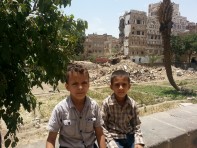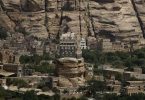
By Asma al-Mohattwari
During Ramadan, Emad and Shauqi used to go together to the mosque, break their fast, and perform the Maghrib prayer. Then they gathered in the street with the rest of their friends singing Ramadan songs. They read the Quran, played, and laughed together. Yet this Ramadan, they couldn’t. Death stole Shauqi and left Emad alone. Emad, 13-years-old, lost his best friend when the Saudi-led coalition airstrike hit his home in al-Qasimi neighborhood in Old Sana’a.
“We planned to have nice days this Ramadan despite the war, but the war took them before Ramadan. I will not cry because I am sure that he is in heaven watching us and smiling,” said Emad.
While he was talking he sadly pointed out the car of Abdualgader, his friend’s father, and said “sometimes Uncle Abdualgader took us on a trip around Sana’a with his car. Now his car is alone after his death. I don’t know who will take it.”
Every Yemeni home has its own sadness because of the war. Some have lost their loved ones or are suffering from the siege that has led to rising food prices and a lack of electricity and petroleum products. Despite the great suffering, Yemenis haven’t lost the spirituality of Ramadan.
Emad and his friends decided to pray for the soul of Shauqi throughout Ramadan to feel that he is still with them.
Nuha Jahaf said that she went to the supermarket and found that all the Ramadan requirements were available and people were buying them as if nothing had happened in the past months. “Yemenis are really steadfast and acclimate to the situation and don’t fear anything. They believe that no one can escape their fate.”
Lamia Jamil said that she hesitated to buy the ingredients for a Ramadan dessert because there was no electricity to turn the refrigerator on. In the end she bought everything and made in the wind so it would be naturally cool.
The day before Ramadan began, four car bombs targeted four mosques in Sana’a. On the third day of Ramadan, a fifth car bomb targeted the Qabat al-Mahdi mosque in Sana’a’s old city. The terrorist acts didn’t prevent people from breaking their fast and praying at the mosques.
Ahmed Ali said, “It is Ramadan, how can we stay at home? Even if I am dead in an attack, I will not stop going to the mosque. To be a martyr is my hope,” he continued with a smile.
Dates are one of the basic foods during Ramadan and people break their fasts with dates and water. Shams al-Mahdi said that they used to break their fast with three dates each, but this Ramadan they only eat one because they are so expensive.
When going out in the street, everything seems normal. People struggle to live their normal lives even with all the difficulties they find. Children are playing in the street, men are reading the Quran in mosques, and women are shopping. They don’t fear airstrikes or even car bombs. Everyone has the hope that everything will be ok and sadness will have its end.






